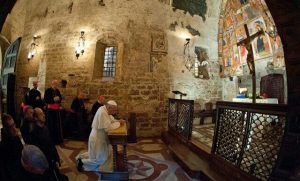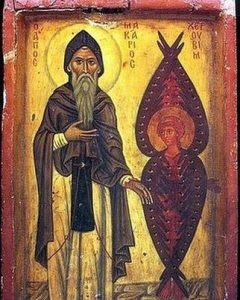 Today, the Pope was at the Portiuncula in Assisi, the first Church to mark the 800th Anniversary of the Pardon of Assisi – “Here at the Portiuncula everything speaks to us of pardon!…”
Today, the Pope was at the Portiuncula in Assisi, the first Church to mark the 800th Anniversary of the Pardon of Assisi – “Here at the Portiuncula everything speaks to us of pardon!…”
Here is a short news brief followed by a video clip from CNS.
Pope Francis gave this mediation on forgiveness:
Dear Brothers and Sisters, Today I would like, before all else, to recall the words that, according to an ancient tradition, Saint Francis spoke in this very place, in the presence of all the townsfolk and bishops: “I want to send you all to heaven!” What finer thing could the Poor Man of Assisi ask for, if not the gift of salvation, eternal life and unending joy, that Jesus won for us by his death and resurrection?
Besides, what is heaven if not the mystery of love that eternally unites us to God, to contemplate him forever? The Church has always professed this by expressing her belief in the communion of saints. We are never alone in living the faith; we do so in the company of all the saints and of our loved ones who practised the faith with joyful simplicity and bore witness to it by their lives. There is a bond, unseen but not for that reason any less real, which makes us, by baptism, “one body” moved by “one Spirit” (cf. Eph 4:4). When Saint Francis asked Pope Honorius III to grant an indulgence to all who visited the Porziuncula, he was perhaps thinking of Jesus’ words to the disciples: “In my Father’s house are many rooms; if it were not so, would I have told you that I go to prepare a place for you? And when I go and prepare a place for you, I will come again and will take you to myself, that where I am you may be also” (Jn 14:2-3).
Forgiveness – pardon – is surely our direct route to that place in heaven. Here at the Porziuncola everything speaks to us of pardon! What a great gift the Lord has given us in teaching us to forgive and in this way to touch the Father’s mercy! We have just heard the parable where Jesus teaches us to forgive (cf. Mt 18:21-35). Why should we forgive someone who has offended us? Because we were forgiven first, and of infinitely more. The parable says exactly this: just as God has forgiven us, so we too should forgive those who do us harm. So too does the prayer that Jesus taught us, the Our Father, in which we say: “Forgive us our debts, as we also have forgiven our debtors” (Mt 6:12). The debts are our sins in the sight of God, and our debtors are those whom we, for our part, must forgive.
Each of us might be that servant in the parable burdened with so great a debt that he could never repay it. When we kneel before the priest in the confessional, we do exactly what that servant did. We say, “Lord, have patience with me”. We are well aware of our many faults and the fact that we often fall back into the same sins. Yet God never tires of offering us his forgiveness each time we ask for it. His is a pardon that is full and complete, one that assures us that, even if we fall back into the same sins, he is merciful and never ceases to love us. Like the master in the parable, God feels compassion, a mixture of pity and love; that is how the Gospel describes God’s mercy towards us. Our Father is moved to compassion whenever we repent, and he sends us home with hearts calm and at peace. He tells us that all is remitted and forgiven. God’s forgiveness knows no limits; it is greater than anything we can imagine and it comes to all who know in their hearts that they have done wrong and desire to return to him. God looks at the heart that seeks forgiveness.
The problem, unfortunately, comes whenever we have to deal with a brother or sister who has even slightly offended us. The reaction described in the parable describes it perfectly: “He seized him by the throat and said, ‘Pay what you owe!’” (Mt 18:28). Here we encounter all the drama of our human relationships. When we are indebted to others, we expect mercy; but when others are indebted to us, we demand justice! This is a reaction unworthy of Christ’s disciples, nor is it the sign of a Christian style of life. Jesus teaches us to forgive and to do so limitlessly: “I do not say to you seven times, but seventy times seven” (v. 22). What he offers us is the Father’s love, not our own claims to justice. To trust in the latter alone would not be the sign that we are Christ’s disciples, who have obtained mercy at the foot of the cross solely by virtue of the love of the Son of God. Let us not forget, then, the harsh saying at the end of the parable: “So also my heavenly Father will do to every one of you, if you do not forgive your brother from your heart” (v. 35).
Dear brothers and sisters, the pardon of which Saint Francis made himself a “channel” here at the Porziuncola continues to “bring forth heaven” even after eight centuries. In this Holy Year of Mercy, it becomes ever clearer that the path of forgiveness can truly renew the Church and the world. To offer today’s world the witness of mercy is a task from which none of us can feel exempted. The world needs forgiveness; too many people are caught up in resentment and harbour hatred, because they are incapable of forgiving. They ruin their own lives and the lives of those around them rather than finding the joy of serenity and peace. Let us ask Saint Francis to intercede for us, so that we may always be humble signs of forgiveness and channels of mercy.

